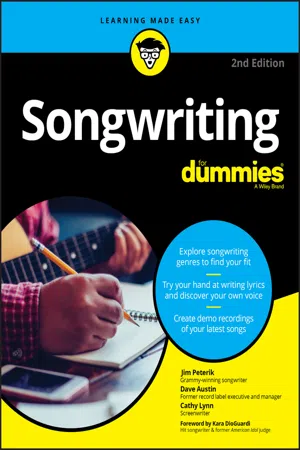
- English
- ePUB (mobile friendly)
- Available on iOS & Android
Songwriting For Dummies
About this book
Proven techniques for songwriting success
This friendly, hands-on guide tackles the new face of the recording industry, guiding you through the shift from traditional sales to downloads and mobile music, as well as how you can harness social media networks to get your music "out there." You get basic songwriting concepts, insider tips and advice, and inspiration for writing — and selling — meaningful, timeless songs.
- Songwriting 101 — get a grip on everything you need to know to write a song, from learning to listen to your "inner voice" to creating a "mood" and everything in between
- Jaunt around the genres — discover the variety of musical genres and find your fit, whether it's rock, pop, R&B, gospel, country, or more
- Let the lyrics out — master the art of writing lyrics, from finding your own voice to penning the actual words to using hooks, verses, choruses, and bridges
- Make beautiful music — find your rhythm, make melodies, and use chords to put the finishing touches on your song
- Work the Web — harness online marketing and social networks like Facebook, Twitter, and others to get your music heard by a whole new audience
Open the book and find:
- What you need to know before you write a single note
- Tips on finding inspiration
- Ways to use poetic devices in lyrics
- Computer and Web-based shortcuts and technologies to streamline songwriting
- A look at famous songwriting collaborators
- Writing for stage, screen, and television
- How to make a demo to get your song heard
- Advice on how to make money from your music
P.S. If you think this book seems familiar, you're probably right. The Dummies team updated the cover and design to give the book a fresh feel, but the content is the same as the previous release of Songwriting For Dummies (9780470615140). The book you see here shouldn't be considered a new or updated product. But if you're in the mood to learn something new, check out some of our other books. We're always writing about new topics!
Tools to learn more effectively

Saving Books

Keyword Search

Annotating Text

Listen to it instead
Information
So You Want to Be a Songwriter
Capturing That Solid-Gold Nugget



Ground Zero — Before You Write a Single Note
Is formal music training a must?
Being prepared when inspiration strikes
Table of contents
- Cover
- Foreword
- Table of Contents
- Introduction
- Part 1: So You Want to Be a Songwriter
- Part 2: Unleashing the Lyricist in You
- Part 3: Creating Memorable Music
- Part 4: Cooperation, Collaboration, and Community
- Part 5: Getting Down to Business
- Part 6: The Part of Tens
- Index
- About the Authors
- Advertisement Page
- Connect with Dummies
- End User License Agreement
Frequently asked questions
- Essential is ideal for learners and professionals who enjoy exploring a wide range of subjects. Access the Essential Library with 800,000+ trusted titles and best-sellers across business, personal growth, and the humanities. Includes unlimited reading time and Standard Read Aloud voice.
- Complete: Perfect for advanced learners and researchers needing full, unrestricted access. Unlock 1.4M+ books across hundreds of subjects, including academic and specialized titles. The Complete Plan also includes advanced features like Premium Read Aloud and Research Assistant.
Please note we cannot support devices running on iOS 13 and Android 7 or earlier. Learn more about using the app


